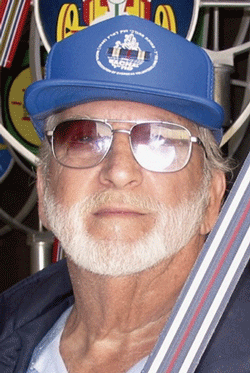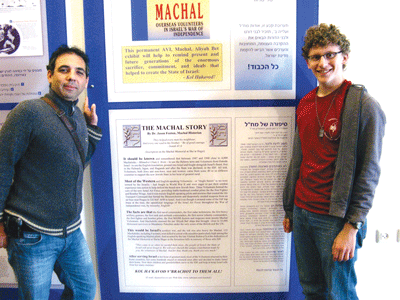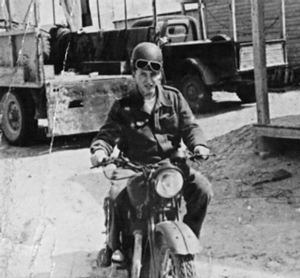Dr. Jason Fenton, the youngest Machalnik, will speak Feb. 16 about the volunteers who fought for Israel’s independence in 1948
By ERIN ELLIOTT BRYAN / Community News Editor
When Dr. Jason Fenton was just 16 years old, he signed up to fight in Israel’s war of independence — lying about his age and his experience as a pilot.
“In my boarding school, they trained us to be army officers and they also gave us flight training,” Fenton told the AJW. “I knew how to fly a little biplane; not very well, but just enough to convince the recruiters that maybe I could fly for Israel.”
Originally from England, Fenton, the son of an Orthodox rabbi, was raised in a family of religious Zionists. At 16, he was an orphan and made his way to Israel, where he joined the approximately 4,000 Jewish and non-Jewish volunteers from 29 countries who risked their lives to fight for the new Jewish state.
 Dr. Jason Fenton
Dr. Jason Fenton
He was the youngest member of the Machal — an acronym meaning “volunteers from outside of Israel” who fought in the 1948 war of independence — and is dedicated to telling and preserving their story.
“In all the other wars after ’48-’49, the Israelis did it all themselves and very brilliantly. But in ’48, they had help; they had serious help from these Machal volunteers who made a huge difference in the outcome of the war,” Fenton said. “My mission is to tell the story that the Israelis didn’t tell.”
Fenton has written a book about his experience, Strength and Courage: The Untold Story of the Machal Volunteers Who Helped Win Israel’s War of Independence, and created a Web site, www.sabranet.com/machal. He has also developed exhibits that are currently on display at the University of Judaism in Los Angeles and at Ammunition Hill in Jerusalem.
Fenton has created a new exhibit celebrating the bravery of Machal volunteers that will be displayed at Adath Jeshurun Congregation in Minnetonka. The exhibit, which includes 16 historical photographs and storyboards, will open with an event 7:30 p.m. Thursday, Feb. 16 at the synagogue.
Fenton, a professor who lives in California and the father of Adath member Tamar Fenton, will speak at the event. The exhibit will remain at Adath Jeshurun through March 14, when it will begin to travel to other synagogues and Jewish organizations around the Twin Cities.
The exhibit is sponsored by the Israel Center of the Minneapolis Jewish Federation, Adath Jeshurun Congregation, the Jewish Community Relations Council of Minnesota and the Dakotas, Minnesotans Against Terrorism, and Israel Market Place by Made in Israel.
 Dr. Jason Fenton’s grandson Asher Pink (right), who was studying in Israel, was present at the recent inauguration of the Machal exhibit at Ammunition Hill in Jerusalem. Pink is pictured with Rafi Helzer, the staff member in charge of the exhibit.
Dr. Jason Fenton’s grandson Asher Pink (right), who was studying in Israel, was present at the recent inauguration of the Machal exhibit at Ammunition Hill in Jerusalem. Pink is pictured with Rafi Helzer, the staff member in charge of the exhibit.
Two other Machalniks, Leon Frankel and Bucky Bacaner, live in the Twin Cities.
“It seems to have a really strong connection to our community and it just made sense. I personally think it’s an honor for us to have it here because [the Machalniks] played an important role in [creating] the state of Israel,” said Eilat Harel, director of the Israel Center at the Minneapolis Jewish Federation. “We should be thanking them because they have a lot to do with our history.”
For Fenton, telling his own story and the story of his fellow volunteers is very important.
“If you go to Israel, very few young people know anything about the war of independence in general and even less about the Machal volunteers’ crucial support for the war,” he said. “And that’s why I do what I do and that’s why you got my exhibit.”
In recounting his own experience, Fenton says he first thought about fighting for Israel when he visited his sister, who worked for a religious Zionist organization. There, he saw “heavily suntanned” young men — “which is very strange in England,” Fenton said — who were recruiting for the Haganah, the predecessor of the Israel Defense Forces (IDF).
“I made a total pest of myself and kept saying, ‘I want to go, I want to do something, I want to fight,’” Fenton said. “They said, ‘There’s nothing going on,’ because it was quite illegal what they were doing, ‘and you’re too young anyway.’”
Fenton persisted and the young recruiters eventually told him how to get involved in the Machal underground. Fenton “bluffed [his] way through” British customs with a one-way ticket to the South of France and found his way to a refugee camp there, where he met survivors of the Nazi death camps.
“We were all waiting,” Fenton said. “We were waiting for the boats to take us on this long, difficult journey, to take us to Israel, and they were waiting for the same boats so that they could have a homeland where they could be free.”
Because he had flight experience, however limited, Fenton was eventually flown to Israel. But in addition to fighting for the Jewish state, he was also looking for his brother, Ivor, who had disappeared and was also believed to be fighting for Israel’s independence.
Amazingly, Fenton found his brother in a hospital, where he had been taken after being seriously wounded in the Negev Desert. Shortly after Fenton explained his plans to receive further flight training in Czechoslovakia, he was curiously reassigned to his brother’s unit: the Fourth Troop, First Antitank Regiment in the Negev.
“I told my brother, ‘I’m sure you saved my life,’” Fenton said. “I never would have survived trying to fly one of these dreadful so-called Messerschmitt 109s or any other planes that the Czechs were selling at that time… A lot of our pilots were killed.”
In total, 122 Machalniks lost their lives, including four women.
 Fenton, pictured in Israel in 1948. (Photos: Courtesy of Dr. Jason Fenton)
Fenton, pictured in Israel in 1948. (Photos: Courtesy of Dr. Jason Fenton)
Both Fenton and his brother survived and are recognized on the Machal Wall of Honor at Ammunition Hill. Fenton eventually made his way back to England to finish his schooling and later immigrated to the United States, where he studied French and history at UCLA.
Now 80 years old, he is a professor of English at Saddleback College in Mission Viejo, Calif. Ivor Fenton is an accountant in England and still has a bullet lodged in his chest — a “strange memento,” according to Fenton.
In addition to his daughter, Tamar, Fenton has two other daughters, Suzanne Fenton-Lieberman, also of the Twin Cities, and Mina Rush, of Los Angeles. He has 11 grandchildren and will celebrate the Bar Mitzva of his grandson, Ronen Pink, while he’s visiting Minnesota.
“I want the story to be known by young Jews so the story can live on, as it should, as a very important part of modern Jewish history,” Fenton said. “In a certain sense, we were part of that miracle that happened in 1948-1949, and of that we’re immensely proud.”
***
Dr. Jason Fenton will speak about his experiences as a Machal volunteer at the opening event for his exhibit 7:30 p.m. Thursday, Feb. 16 at Adath Jeshurun Congregation, 10500 Hillside Ln. W., Minnetonka. The exhibit will be displayed through March 14 at Adath before traveling throughout the Twin Cities.
For information, contact Eilat Harel at 952-417-2321 or: eharel@mplsfed.org.
(American Jewish World, 2.3.12)









 Dr. Jason Fenton
Dr. Jason Fenton Dr. Jason Fenton’s grandson Asher Pink (right), who was studying in Israel, was present at the recent inauguration of the Machal exhibit at Ammunition Hill in Jerusalem. Pink is pictured with Rafi Helzer, the staff member in charge of the exhibit.
Dr. Jason Fenton’s grandson Asher Pink (right), who was studying in Israel, was present at the recent inauguration of the Machal exhibit at Ammunition Hill in Jerusalem. Pink is pictured with Rafi Helzer, the staff member in charge of the exhibit. Fenton, pictured in Israel in 1948. (Photos: Courtesy of Dr. Jason Fenton)
Fenton, pictured in Israel in 1948. (Photos: Courtesy of Dr. Jason Fenton)










